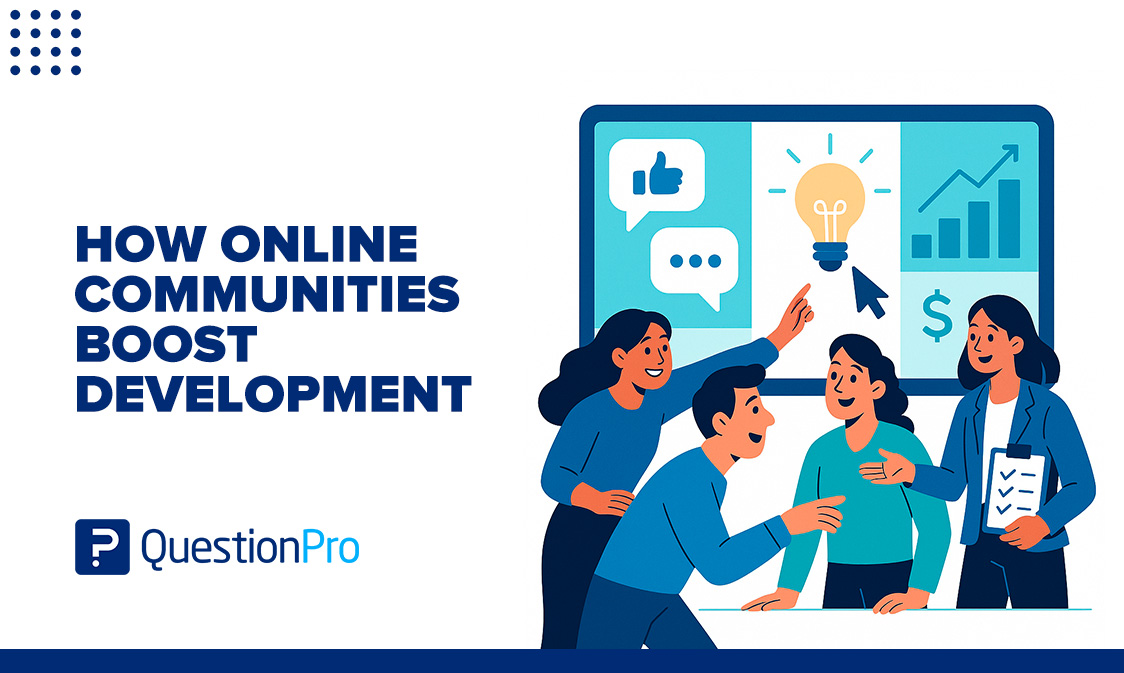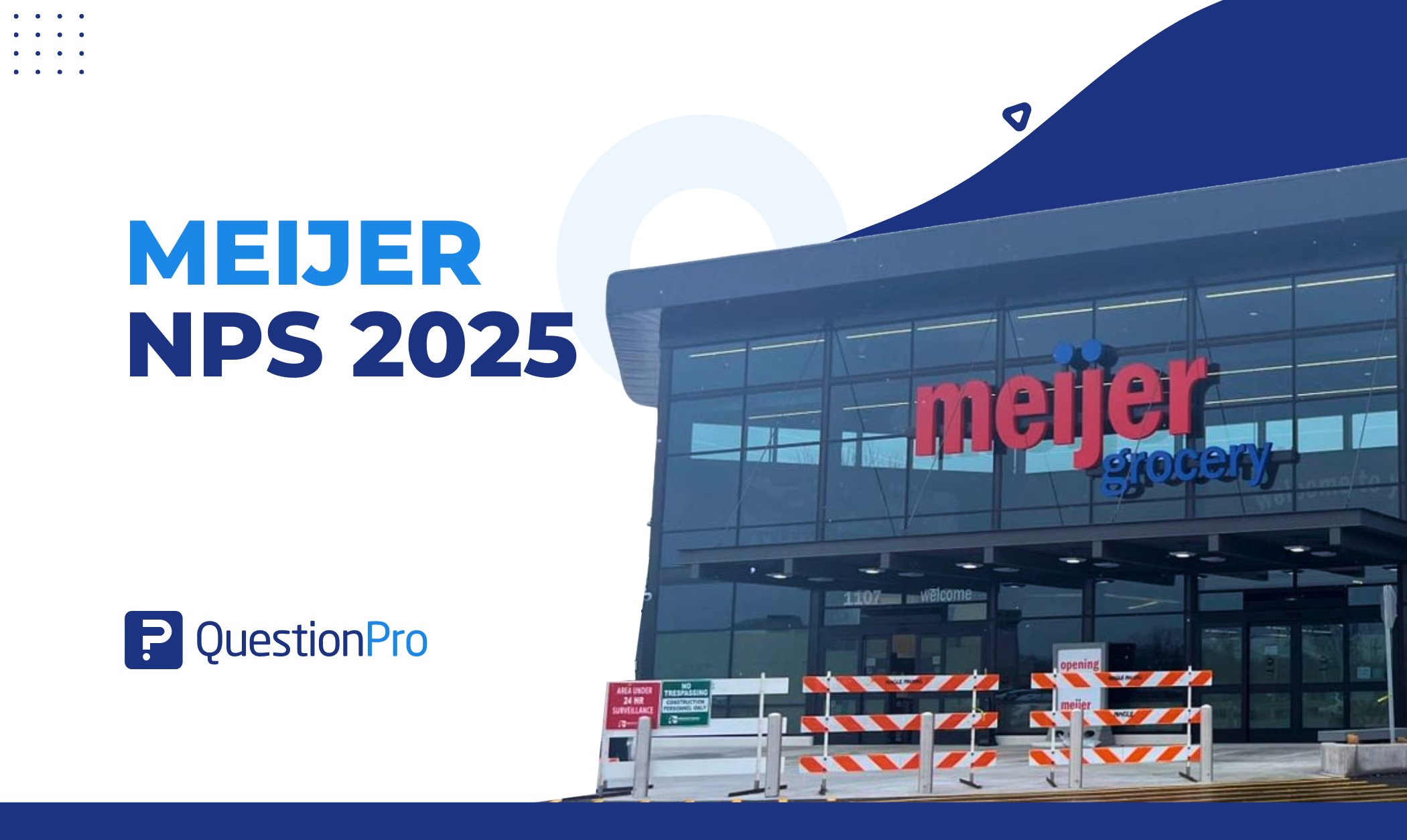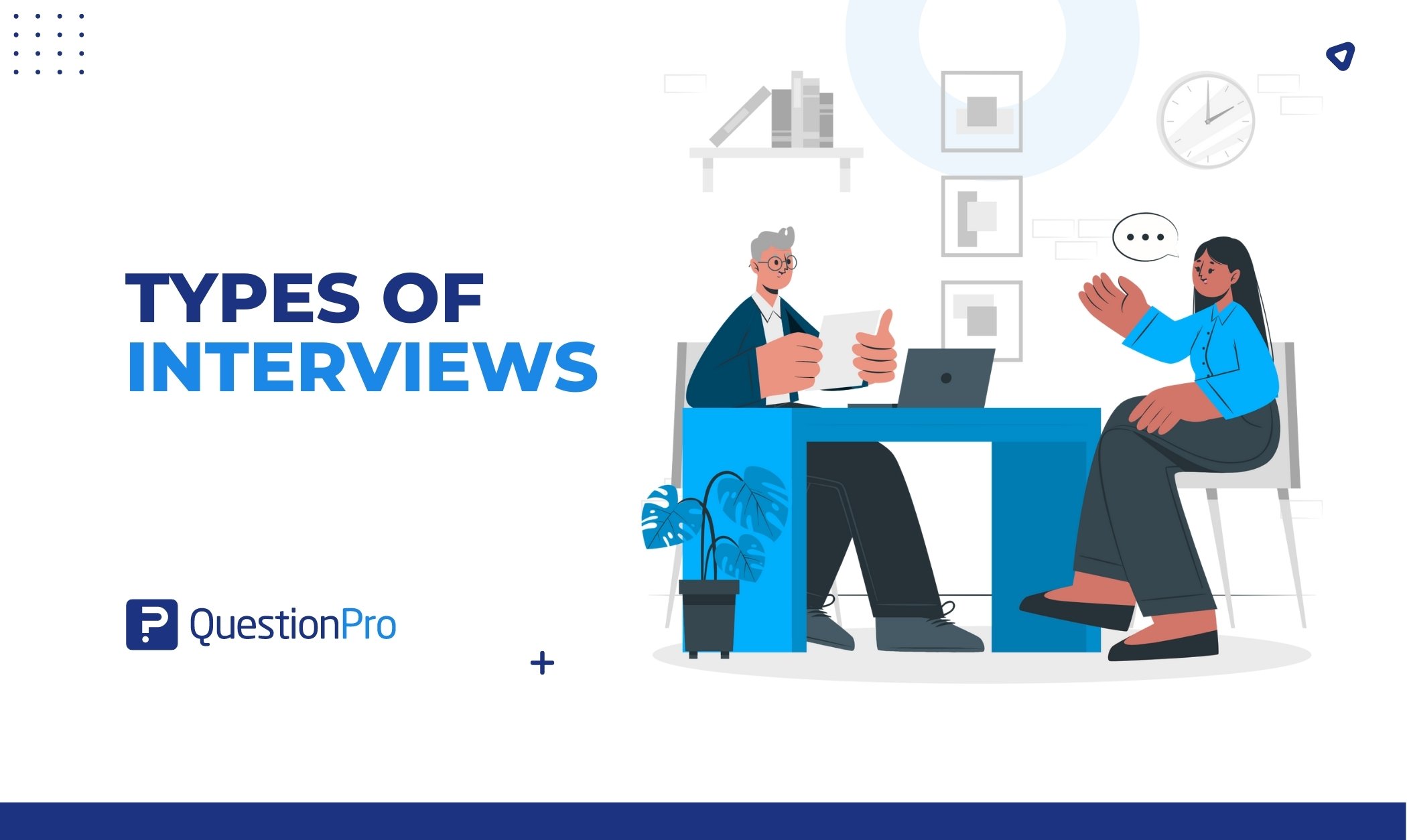
There are more types of interviews than most people think. An interview is generally a qualitative research technique that involves asking open-ended questions to converse with respondents and collect elicit data about a subject.
The interviewer, in most cases, is the subject matter expert who intends to understand respondent opinions in a well-planned and executed series of star questions and answers.
Interviews are similar to focus groups and surveys for garnering information from the target market but are entirely different in their operation – focus groups are restricted to a small group of 6-10 individuals, whereas surveys are quantitative.
Interviews are conducted with a sample from a population, and the key characteristic they exhibit is their conversational tone.
LEARN ABOUT: telephone survey
What is An Interview?
An interview is a way to get information from a person by asking questions and hearing their answers.
An interview is a question-and-answer session where one person asks questions, and the other person answers those questions. It can be a one-on-one, two-way conversation, or there can be more than one interviewer and more than one participant.
The interview is the most important part of the whole selection bias process. It is used to decide if a person should be interviewed further, hired, or taken out of consideration. It is the main way to learn more about applicants and the basis for judging their job-related knowledge, research skills, and abilities.
Fundamental Types of Interviews in Research
A researcher has to conduct interviews with a group of participants at a juncture in the research where information can only be obtained by meeting and personally connecting with a section of their target audience. Interviews offer the researchers a platform to prompt their participants and obtain inputs in the desired detail. There are three fundamental types of interviews in research:
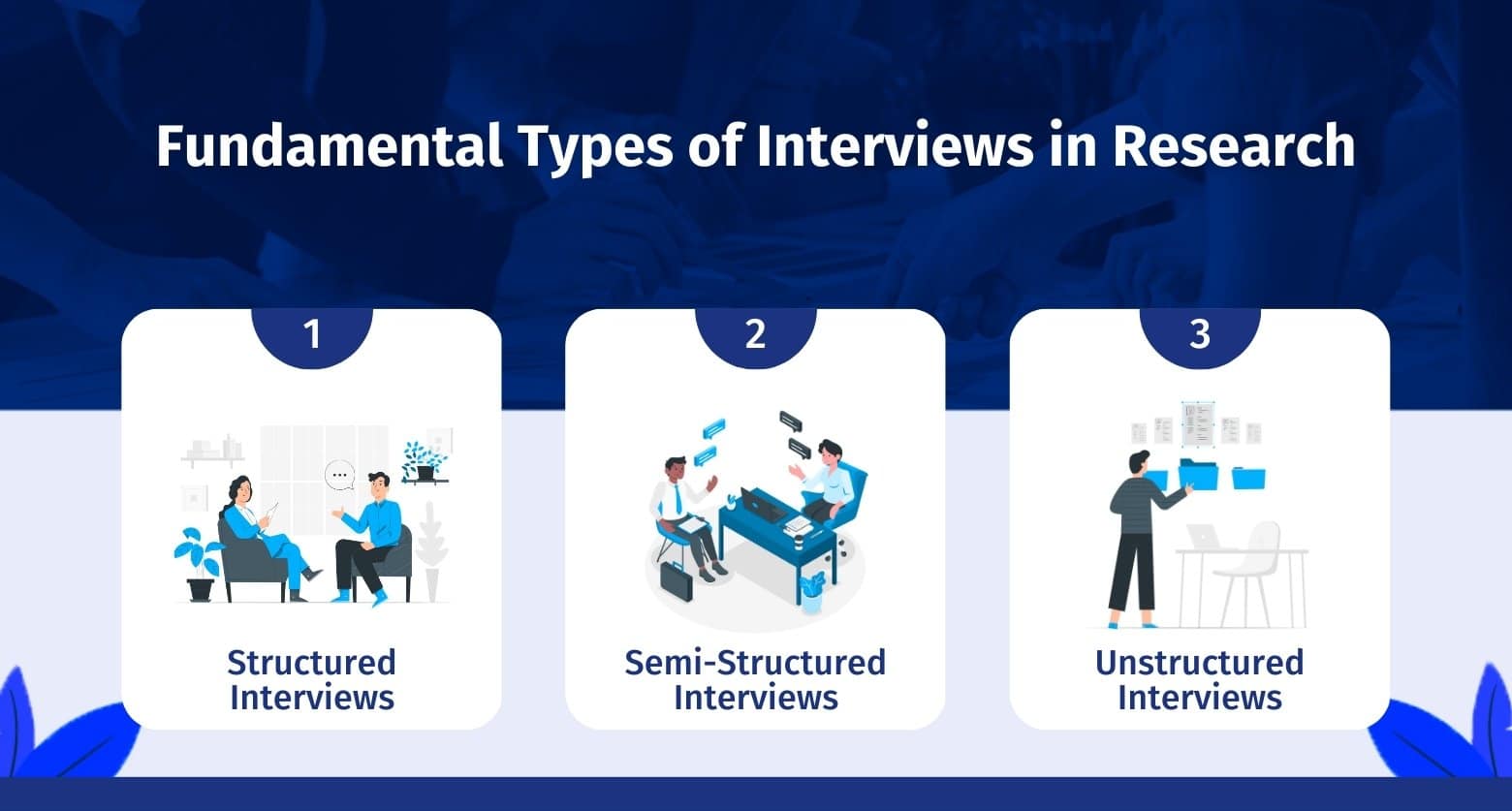
1. Structured Interviews:
Structured interviews are defined as research tools that could be more flexible in their operations are allow more or no scope of prompting the participants to obtain and analyze results. It is thus also known as a standardized interview and is significantly quantitative in its approach.
Questions in this interview are pre-decided according to the required detail of information. This can be used in a focus group interview and an in-person interview.
These interviews are excessively used in survey research with the intention of maintaining uniformity throughout all the interview sessions.
LEARN ABOUT: Research Process Steps
They can be closed-ended and open-ended – according to the type of target population. Closed-ended questions can be included to understand user preferences from a collection of answer options. In contrast, open-ended ones can be included to gain details about a particular section in the interview.
Example of a structured interview question:
Here’s an example of a structured question for a job interview for a customer service job:
- Can you talk about what it was like to work in customer service?
- How do you deal with an angry or upset customer?
- How do you ensure that the information you give customers is correct?
- Tell us about when you went out of your way to help a customer.
- How do you handle a lot of customers or tasks at once?
- Can you talk about how you’ve used software or tools for customer service?
- How do you set priorities and use your time well while giving good customer service?
- Can you tell us about when you had to get a customer to calm down?
- How do you deal with a customer who wants something that goes against your company’s rules?
- Tell me about a time when you had to deal with a hard customer or coworker.
Advantages of structured interviews:
- It focuses on the accuracy of different responses, due to which extremely organized data can be collected. Different respondents have different types of answers to the same structure of questions – answers obtained can be collectively analyzed.
- They can be used to get in touch with a large sample of the target population.
- The interview procedure is made easy due to the standardization offered by it.
- Replication across multiple samples becomes easy due to the same structure of the interview.
- As the scope of detail is already considered while designing the interview questions, better information can be obtained. The researcher can analyze the research problem comprehensively by asking accurate research questions.
- Since the structure of the interview is fixed, it often generates reliable results and is quick to execute.
- The relationship between the researcher and the respondent is not formal, due to which the researcher can clearly understand the margin of error in case the respondent either degree to be a part of the survey or is just not interested in providing the right information.
Disadvantages of structured interviews:
- The limited scope of assessment of obtained results.
- The accuracy of information overpowers the detail of information.
- Respondents are forced to select from the provided answer options.
- The researcher is expected to always adhere to the list of decided questions, irrespective of how interesting the conversation is turning out to be with the participants.
- A significant amount of time is required for a structured interview.
Learn more: Market Research
2. Semi-Structured Types of Interviews:
Semi-structured interviews offer a considerable amount of leeway to the researcher to probe the respondents, along with maintaining a basic interview structure. Even if it is a guided conversation between researchers and interviewees – appreciable flexibility is offered to the researchers. A researcher can be assured that multiple interview rounds will not be required in the presence of structure in this type of research interview.
Keeping the structure in mind, the researcher can follow any idea or take creative advantage of the entire interview. Additional respondent probing is always necessary to garner information for a research study. The best application of semi-structured interviews is when the researcher doesn’t have time to conduct research and requires detailed information about the topic.
Example of a semi-structured interview question:
Here’s an example of a semi-structured marketing job interviews question:
- Can you tell us about the marketing work you’ve done?
- What do you think are the most important parts of a marketing campaign that works?
- Tell me about a campaign you worked on that you’re very proud of.
- How do you do research on the market and look at data to help you make marketing decisions?
- Can you tell us about a time when you had to change your marketing plan because of something that didn’t go as planned?
- How do you figure out if a marketing campaign worked?
- Can you talk about how you’ve used social media to market?
- How do you ensure your marketing message gets through to the people you want to hear it?
- Can you tell us about a time when you had to run a marketing campaign on a small budget?
- How do you keep up with changes and trends in marketing?
Advantages of semi-structured interviews:
- Questions from semi-structured interview questions are prepared before the scheduled interview, giving the researcher time to prepare and analyze the questions.
- It is flexible to an extent while maintaining the research guidelines.
- Unlike a structured interview, researchers can express the interview questions in the preferred format.
- Reliable qualitative data can be collected via these interviews.
- The flexible structure of the interview.
Learn more: Quantitative Data
Disadvantages of semi-structured interviews:
- Participants may question the reliability factor of these interviews due to the flexibility offered.
- Comparing two different answers becomes difficult as the guideline for conducting interviews is not entirely followed. No two questions will have the exact same structure, and the result will be an inability to compare are infer results.
3. Unstructured Interviews:
Also called in-depth interviews, unstructured interviews are usually described as conversations held with a purpose in mind – to gather data about the research study. These interviews have the least number of questions as they lean more towards a normal conversation but with an underlying subject.
The main objective of most researchers using unstructured interviews is to build a bond with the respondents, due to which there is a high chance that the respondents will be 100% truthful with their answers. There are no guidelines for the researchers to follow. So they can approach the participants ethically to gain as much information as possible about their research topic.
Since there are no guidelines for these interviews, a researcher is expected to keep their approach in check so that the respondents do not sway away from the main research motive.
For a researcher to obtain the desired outcome, he/she must keep the following factors in mind:
- The intent of the interview.
- The interview should primarily take into consideration the participant’s interests and skills.
- All the conversations should be conducted within the permissible limits of research, and the researcher should try and stick by these limits.
- The researcher’s skills and knowledge should match the interview’s purpose.
- Researchers should understand the dos and don’ts of it.
Example of an unstructured interview question:
Here’s an example of a question asked in an unstructured interview:
- Can you tell me about when you had to deal with something hard and how you did it?
- What are some of the things you’re most proud of, and what did you learn from them?
- How do you deal with ambiguity or not knowing what to do at work?
- Can you describe how you lead and how you get your team going?
- Tell me about a time when you had to take a chance and how it turned out.
- What do you think are the most important qualities for success in this role?
- How do you deal with setbacks or failures, and what do you learn from them?
- Can you tell me about a time when you had to solve a problem by thinking outside the box?
- What do you think makes you different from the other people who want this job?
- Can you tell me about a time when you had to make a hard choice and how you made that choice?
Advantages of Unstructured Interviews:
- Due to this type of interview’s informal nature, it becomes extremely easy for researchers to try and develop a friendly rapport with the participants. This leads to gaining insights in extreme detail without much conscious effort.
- The participants can clarify all their doubts about the questions, and the researcher can take each opportunity to explain his/her intention for better answers.
- There are no questions that the researcher has to abide by, and this usually increases the flexibility of the entire research process.
Disadvantages of Unstructured Interviews:
- Researchers take time to execute these interviews because there is no structure to the interview process.
- The absence of a standardized set of questions and guidelines indicates that its reliability of it is questionable.
- The ethics involved in these interviews are often considered borderline upsetting.
Learn more: Qualitative Market Research & Qualitative Data Collection
Other Types of Interviews
Besides the 3 basic interview types, we have already mentioned there are more. Here are some other interview types that are commonly used in a job interview:
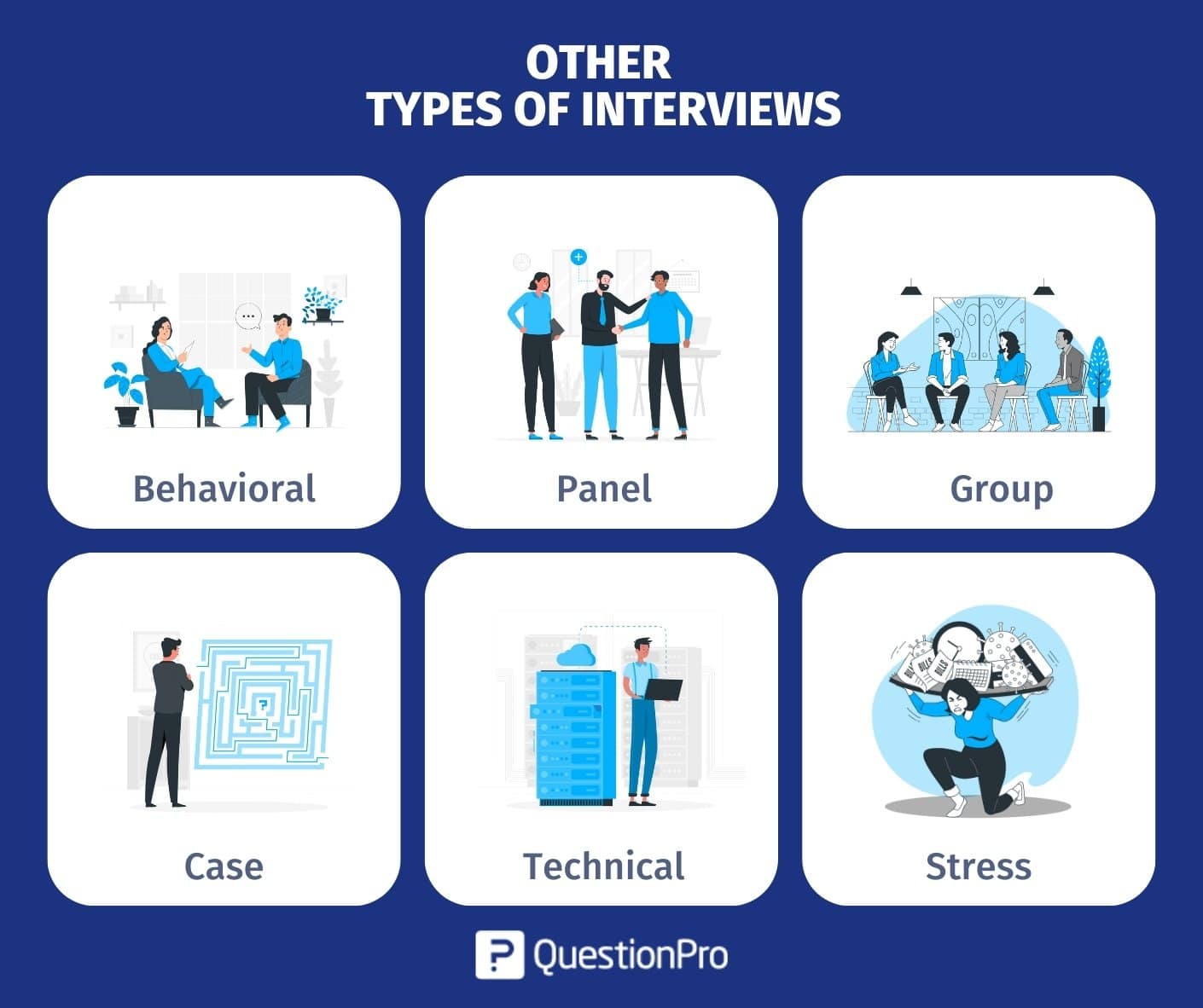
Behavioral Interview
During this type of interview, candidates are asked to give specific examples of how they have acted in the past. The idea behind this kind of interview is that what someone did in the past can be a sign of how they will act in the future. And by this interview, the company can also understand the interviewee’s behavior through body language.
Panel Interview
During a panel interview, three or more interviewers usually ask questions and evaluate the candidate’s answers as a group. This is a good way to get a full picture of a candidate’s skills and suitability for the job.
Group Types of Interviews
Multiple people are interviewed at the same time in group interviews. This form of interview often focus groups that are utilized on entry-level positions or employment in customer service to examine how well candidates get along with others and function as a team.
Case Interview
During a case interview, candidates are given a business problem or scenario and asked to think about how to solve it. In the consulting and finance fields, this kind of interview is common.
Technical Interview
A candidate’s technical skills and knowledge are tested during a technical interview, usually in fields like engineering or software development. Most of the time, candidates are asked to solve problems or complete technical tasks.
Stress Interview
During a stress interview, candidates are put under pressure or asked difficult or confrontational questions on purpose to see how they react in stressful situations. This kind of interview is used to see how well a candidate can deal with stress and hard situations.
Methods of Research Interviews:
There are four methods to conduct research interviews, each of which is peculiar in its application and can be used according to the research study requirement.
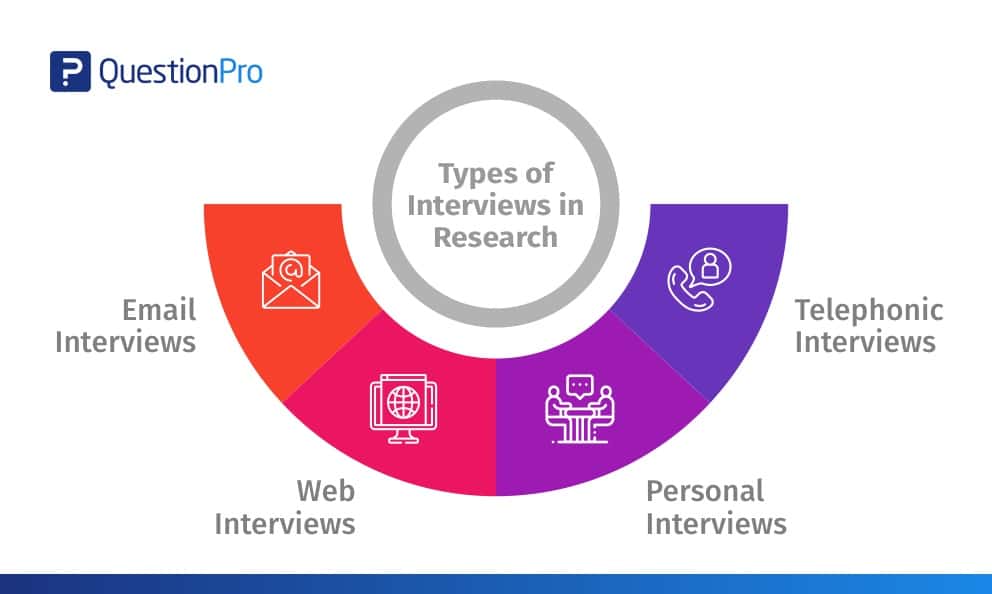
Personal Interviews:
Personal interviews are one of the most used types of interviews, where the questions are asked personally directly to the respondent as a form of an individual interview. One of the many in-person interviews is a lunch interview, which is frequently better suited for casual inquiries and discussions.
For this, a researcher can have a guide to online surveys to take note of the answers. A researcher can design his/her survey in such a way that they take notes of the comments or points of view that stands out from the interviewee. It can be a one-on-one interview as well.
Advantage:
- Higher response rate.
- When the interviewees and respondents are face-to-face, there is a way to adapt the questions if this is not understood.
- More complete answers can be obtained if there is doubt on both sides or a remarkable piece of information is detected.
- The researcher has an opportunity to detect and analyze the interviewee’s body language at the time of asking the questions and taking notes about it.
Disadvantages:
- They are time-consuming and extremely expensive.
- They can generate distrust on the part of the interviewee since they may be self-conscious and not answer truthfully.
- Contacting the interviewees can be a real headache, either scheduling an appointment in workplaces or going from house to house and not finding anyone.
- Therefore, many interviews are conducted in public places like shopping centers or parks. Even consumer studies take advantage of these sites to conduct interviews or surveys and give incentives, gifts, and coupons. In short, There are great opportunities for online research in shopping centers.
- Among the advantages of conducting such types of interviews is that the respondents will have more fresh information if the interview is conducted in the context and with the appropriate stimuli so that researchers can have data from their experience at the scene of the events immediately and first hand. The interviewer can use an online survey through a mobile device that will undoubtedly facilitate the entire process.
Telephonic Type of Interviews:
Phonic interviews are widely used and easily combined with online surveys to conduct research effectively.
Advantages:
- To find the interviewees, it is enough to have their phone numbers on hand.
- They are usually lower cost.
- The information is collected quickly.
- Having a personal contact can also clarify doubts or give more details of the questions.
Disadvantages:
- Many times researchers observe that people do not answer phone calls because it is an unknown number for the respondent or simply already changed their place of residence and they cannot locate it, which causes a bias in the interview.
- Researchers also face that they simply do not want to answer and resort to pretexts such as they are busy to answer, they are sick, they do not have the authority to answer the questions asked, they have no interest in answering, or they are afraid of putting their security at risk.
- One of the aspects that should be taken care of in these types of interviews is the kindness with which the interviewers address the respondents in order to get them to cooperate more easily with their answers. Good communication is vital for the generation of better answers.
Learn More: Data Collection Methods: Types & Examples
Email or Web Page Types of Interviews:
Online research is growing more and more because consumers are migrating to a more virtual world, and it is best for each researcher to adapt to this change.
The increase in people with Internet access has made it popular that interviews via email or web page stand out among the types of interviews most used today. For this nothing better than an online survey.
More and more consumers are turning to online shopping, which is why they are a great niche to be able to carry out an interview that will generate information for the correct decision-making.
Advantages of email surveys:
- Speed in obtaining data
- The respondents respond according to their time, when they want, and where they decide.
- Online surveys can be mixed with other research methods or using some of the previous interview models. They are tools that can perfectly complement and pay for the project.
- A researcher can use a variety of questions and logic to create graphs and reports immediately.
Disadvantages of email survey:
- Low response rates
- Limited access to certain populations
- Potential for spam filters
- Lack of personal touch
What to Avoid in Different Types of Interviews
Try not to do any of the following things when you’re in an interview:
- Don’t blame your previous managers, coworkers, or companies. This will make a bad impression on the interviewer and show that you are not accountable.
- Do not go to the interview without knowing anything about the company you are interviewing for. Interviewers will think you don’t care about learning about the company if you don’t know anything.
- Don’t fidget with things because that shows you lack self-confidence and focus.
- Stop checking the time because it shows that you have something more important to do and that you don’t give the interview much importance.
Related Questions of Interviews
After the interview is over, you might also get a chance to ask some questions. You should make the most of this chance to learn useful things from the interviewer. Based on what you’ve learned, you can then decide if the company and the job are a good fit for you. You can ask the interviewer questions about the company or about the job role.
Here are some common but important questions to ask in an interview:
- What do you anticipate from team members in this role?
- What does a typical day look like for an employee in this role?
- What qualities are essential for success in this position?
- How is success measured for this position?
- How does this job profile relate to the organization’s overarching objectives?
- What are your company’s guiding principles?
- Which departments will I work closely with throughout my time in this profile?
Learn more: Quantitative Research
Conclusion
To summarize the discussion, an effective interview will be one that provides researchers with the necessary data to know the object of study and that this information is applicable to the decisions researchers make.
Undoubtedly, the objective of the research will set the pattern of what types of interviews are best for data collection. Based on the research design, a researcher can plan and test the questions, for instance, if the questions are correct and if the survey flows in the best way.
LEARN ABOUT: Best Data Collection Tools
In addition, other types of research can be used under specific circumstances.
For example, there are no connections or adverse situations to carry out surveyors. In these types of occasions, it is necessary to conduct field research, which can not be considered an interview if not rather a completely different methodology.
QuestionPro is a flexible online survey platform that can help researchers do different kinds of interviews, like structured, semi-structured, unstructured, phone interview, group interview, etc. It gives researchers a flexible platform that can be changed to fit their needs and the needs of their research project.
QuestionPro can help researchers get detailed and useful information from participants using features like skip logic, piping, and live chat. Also, the platform is easy to use and get to, making it a useful tool for researchers to use in their work.
LEARN ABOUT: Candidate Experience Survey
Overall, QuestionPro can be helpful for researchers who want to do good interviews and collect good project data.
FAQ
The 3 main types of interviews are
1. Structured interviews
2. Semi-structured interviews
3. Unstructured interviews
There are different ways to conduct an interview, and each one can add depth and substance to the information the interviewer gathers by asking questions. We discuss four interview methods: situational, professional behavior profiling, stress, and behavioral.
Face-to-face means in-person interviews are the most common type of interview. It’s about getting a good sense of the candidate by focusing on them directly. But it also allows the person interviewed to talk freely and ask questions.
Personal interviews, phone interviews, email or web page interviews, and a combination of these methods are the four types of research interviews.





